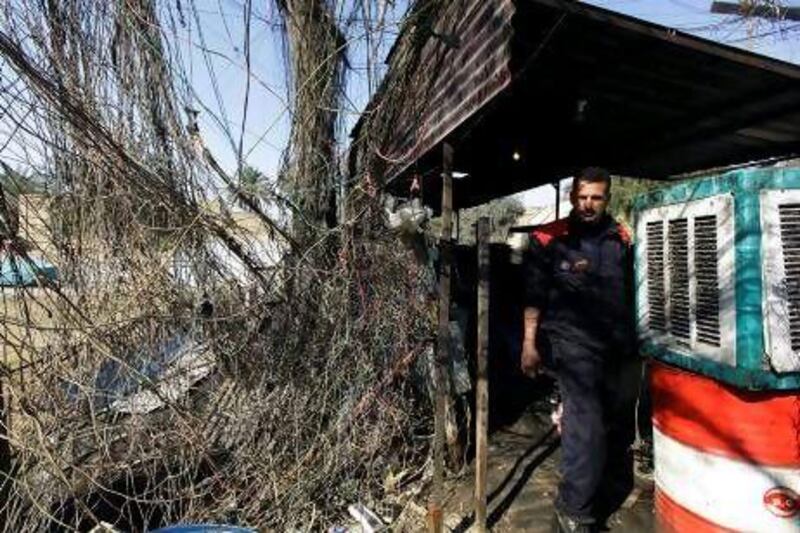At least four times a day, Hadi Ahmed leaves his Baghdad home and goes out into the sweltering heat to restart his generator.
"We are dying in this heat," he says. "I feel like every day this country is going backwards. The lack of electricity is destroying my business."
Mr Ahmed spends about US$3,000 (Dh11,018) a month producing electricity to power a plastics factory that manufactures household items. He says he can afford to operate the factory at only a third of capacity.
"Out of six machines, because of the current circumstances, I only have two operational," said Mr Ahmed.
His frustration is shared by many entrepreneurs across Iraq, nine years after the United States-led invasion that toppled Saddam Hussein. Iraq is able to produce only 8,000 megawatts of electricity against demand of 14,000 megawatts, according to the electricity ministry.
"There is no support for the private sector. I have had to reduce my workforce from 18 workers to five because I have less machines in operation," Mr Ahmed said. "At the same time, I cannot compete with Chinese, Iranian and Syrian imported products because my costs are higher."
Iraq's government hopes to cover the electricity deficit by the end of next year after spending nearly $30 billion on gas and steam turbines to instal in power plants.
The electricity ministry plans to increase its power offering from the current nine to 12 hours per day to 20 hours daily by the end of next year. "About 90 per cent of the factories in central Iraq have closed, or investors have shifted their operations to Iraqi Kurdistan and neighbouring regional countries where there is reliable electricity," said Musab Al Mudaris, an electricity ministry spokesman. "We hope that they will restart their operations here when the electricity supply reaches acceptable levels soon. God willing these are the last few months."
Mr Al Mudaris said that if the current number of factories restarted operations fully, demand could surge to between 20,000 megawatts and 24,000 megawatts.
The ministry currently has 42 power projects in operation, with the percentage of completion ranging from 60 per cent to 80 per cent, Mr Al Mudaris says. "The plants will soon come online and enter the electricity grid."
Among the ministry's biggest deals for power plant equipment are a 2008 agreement with General Electric to supply turbines to generate 6,800 megawatts of power and an agreement with Germany's Siemens to generate an additional 2,000 megawatts. But installing the power plants has taken time because of the lack of security in Iraq.
"The circumstances that the country went through has had a very negative impact on the country's electricity grid, which spans more than 32,000 kilometres. It was constantly being subject to sabotage," said Mr Al Mudaris.
"At the same time, foreign companies which supplied equipment and expertise withdrew their people on the ground after they saw many of them get kidnapped or killed. But with some relative stability, we are back on track," he said.
Investors in Baghdad Soft Drinks, a publicly listed company that has the franchise rights for Pepsi in Iraq, say the company's largest manufacturing company has suffered from the lack of power.
The company posted an operating loss of 500 million dinars (Dh1.5m) in the first quarter of this year, compared with an operating loss of 2.7bn dinars in last year's first quarter. It posted a profit of 1.7bn dinars after an increase in other revenue.
"The current state of the electricity grid means operational margins are completely inadequate for commercial purposes," said Geoffrey Batt, the head of the Euphrates Iraq Fund, which has $25m of assets under management.
"Manufacturing needs reliable electricity. If resumption reaches normal levels, we would see a noticeable improvement on the company's operating margin and any increase in revenues would go straight to the bottom line," he says.
twitter: Follow and share our breaking business news. Follow us
iPad users can read the digital edition of business section as it was printed via our e-reader app. Click here





